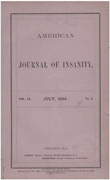Multicenter, placebo-controlled study of fluoxetine in seasonal affective disorder
Abstract
OBJECTIVE: The authors investigated the efficacy and safety of fluoxetine in the treatment of winter seasonal affective disorder. METHOD: Sixty-eight outpatients who met the DSM-III-R criteria for recurrent major depressive episodes, seasonal (winter) pattern, were randomly assigned to 5 weeks of treatment with fluoxetine, 20 mg/day (N = 36), or placebo (N = 32). The outcome measures included the 29-item modified Hamilton Depression Rating Scale, administered by experienced clinicians, and the self-rated Beck Depression Inventory; adverse events and safety data were also recorded. Clinical response was defined as a greater than 50% reduction in depression score between baseline and study termination. RESULTS: Both groups showed significant improvement. The fluoxetine group had lower depression scores at termination than the placebo group, but these differences did not achieve statistical significance. However, the rate of clinical response in the fluoxetine group (59%) was superior to that in the placebo group (34%). Post hoc analyses showed that the greatest fluoxetine responses were in the most markedly depressed patients and that overall response was greater for patients studied later in the season. Fluoxetine was well tolerated, and few subjects dropped out because of adverse events. CONCLUSIONS: On the basis of clinical response rate, fluoxetine appears to be an effective, well-tolerated treatment for seasonal affective disorder. Because the differences between fluoxetine and placebo in the continuous outcome measures did not reach statistical significance, further studies with larger study groups and longer treatment periods are required to conclusively demonstrate efficacy of fluoxetine for seasonal affective disorder.
Access content
To read the fulltext, please use one of the options below to sign in or purchase access.- Personal login
- Institutional Login
- Sign in via OpenAthens
- Register for access
-
Please login/register if you wish to pair your device and check access availability.
Not a subscriber?
PsychiatryOnline subscription options offer access to the DSM-5 library, books, journals, CME, and patient resources. This all-in-one virtual library provides psychiatrists and mental health professionals with key resources for diagnosis, treatment, research, and professional development.
Need more help? PsychiatryOnline Customer Service may be reached by emailing [email protected] or by calling 800-368-5777 (in the U.S.) or 703-907-7322 (outside the U.S.).



